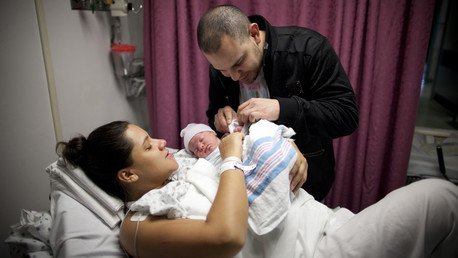San Francisco approves 6 weeks of fully-paid parental leave

Hot on the heels of New York’s paid leave expansion, San Francisco has approved a measure making it the first city in the United States to require companies to offer six weeks of fully-paid parental leave to their employees.
The proposal was unanimously approved by the city’s Board of Supervisors, AP reported, though one more formal vote is required before the measure can be sent to Mayor Ed Lee, who is expected to sign it into law.
Already, residents of California can get six weeks of partially-paid leave – they receive about 55 percent of their normal wages – through a state insurance program that workers pay into. In San Francisco, though, the new measure would require businesses to provide the other 45 percent of the cash so that residents can receive fully-paid leave.
The measure was billed by supporters as an important way to support workers who don’t have access to paid leave. Any new mother or father who works for at least eight hours a week in San Francisco will be eligible.
New York, California reach deals to raise minimum wage to $15 per hour https://t.co/QQQnOwRSmEpic.twitter.com/Pe3CmYbqbY
— RT America (@RT_America) April 2, 2016
“Our country’s parental leave policies are woefully behind the rest of the world, and today San Francisco has taken the lead in pushing for better family leave policies for our workers,” said Supervisor Scott Wiener, who supported the bill, according to USA Today.
“We shouldn’t be forcing new mothers and fathers to choose between spending precious bonding time with their children and putting food on the table.”
Starting in January 2017, companies with 50 or more employees will have to start offering fully-paid leave. Those with 35 to 49 workers have to start offering the leave by July 2017, and businesses with 20 to 34 employees must comply by January 2018.
While workers can receive up to 12 weeks of unpaid leave under federal law, the movement calling for paid leave is gaining momentum around the US, particularly among liberal and Democratic activists. San Francisco also passed a $15 minimum wage back in 2014, which recently became approved for the whole state.
However, small businesses have expressed concern over the paid leave and minimum wage proposals, arguing they simply do not have the ability to provide fully-paid leave.
"They don't necessarily have the resources, they can't absorb the increases in cost, and they feel like it's kind relentless, it's one thing after the next," Dee Dee Workman, vice-president of public policy at the San Francisco Chamber of Commerce, told AP.
According to San Francisco’s Office of Economic Analysis, the measure could potentially cost local businesses more than $32 million a year if both men and women take advantage of it. The rule will likely raise city households’ spending, but the cost of hiring may rise and job creation may also slow down.
One consequence of the measure could be that retailers pass the cost of the measure on to consumers, something that many in the city may be willing to stomach in order to keep the city livable for those on lower incomes.
"I am a business person and a resident of San Francisco, and I know that if they can pass on that expense, people will pay it,” said Jason Geller of the employment law office Fisher & Phillips to AP. "We know that consumers in San Francisco will pay higher prices."
San Francisco’s move comes just one day after New York approved a measure allowing for up to 12 weeks of partially-paid leave, now one of the most generous statewide laws in the country. New York’s program applies to new parents as well as those with sick family members.
Top US female #soccer stars file wage discrimination complaint against #USSFhttps://t.co/Jp7HH8qWdspic.twitter.com/LyBcBOalkg
— RT Sport (@rtsportnews) March 31, 2016
Starting in 2018, workers in New York will be eligible to receive 50 percent of their weekly wage while on leave, rising to 67 percent by 2021. The paid leave will be funded by a $1 payroll tax on employees every week.
“These policies will not only lift up the current generation of low-wage workers and their families, but ensure fairness for future generations and enable them to climb the ladder of opportunity,” said New York Governor Andrew Cuomo on Monday.
The measure approved in New York also includes raising the state minimum wage to $15 per hour by 2018.













